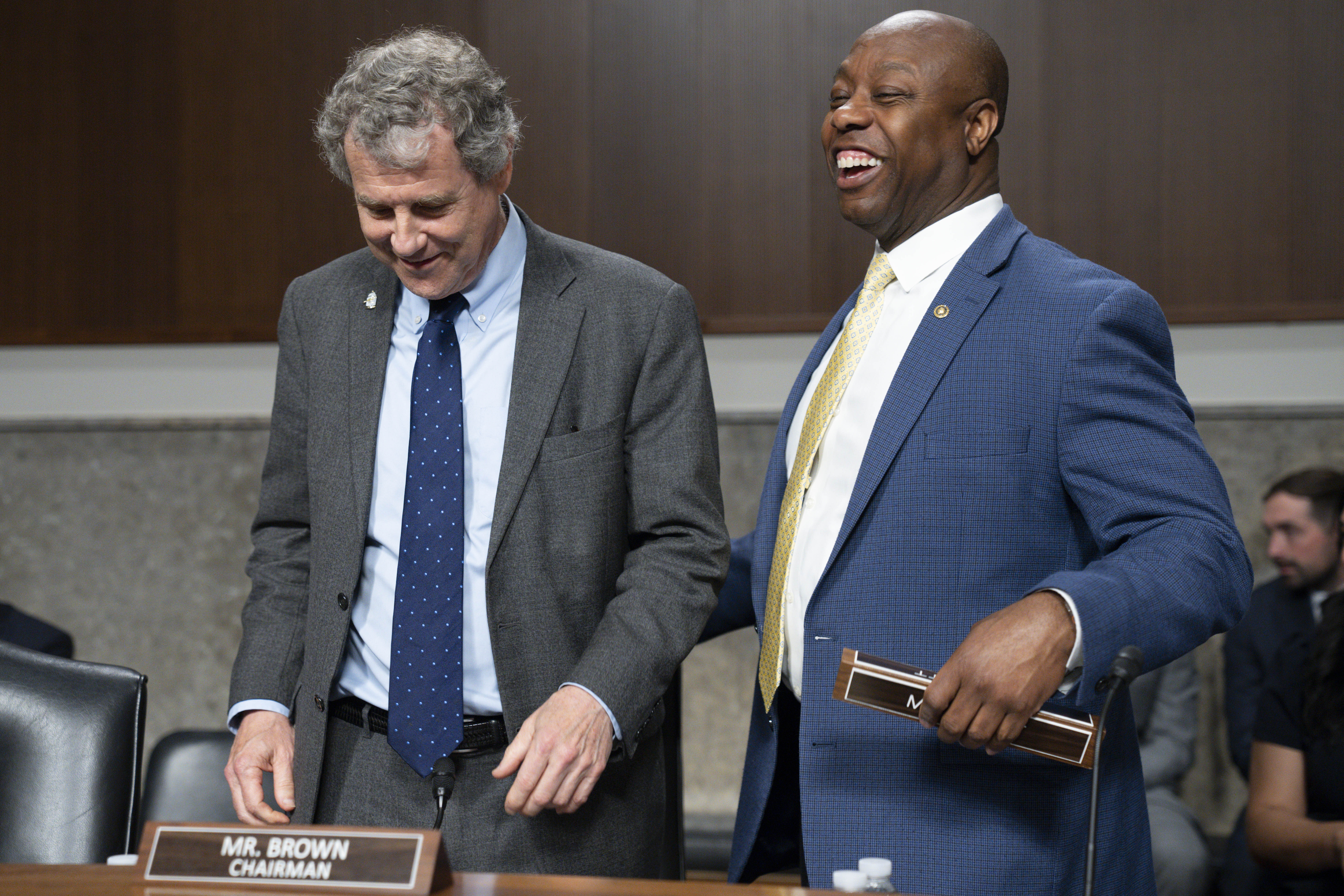Sherrod Brown strikes banking deal with Tim Scott, Elizabeth Warren and J.D. Vance
The compromise represents Congress’ most viable option for revamping the banking system following the rescue of Silicon Valley Bank and other lenders.


The Senate Banking Committee in a bipartisan vote Wednesday agreed to ratchet up penalties for the executives of failed lenders, increase oversight of the Federal Reserve and restrict megabank takeovers, in Washington’s most significant response yet to this year’s banking turmoil.
The committee approved the bill in a 21-2 vote, overcoming a rift between Senate Banking Chair Sherrod Brown (D-Ohio), who negotiated the legislation with Sens. Tim Scott (R-S.C.), and Elizabeth Warren (D-Mass.), who had been pushing her own bipartisan plan in recent weeks. Warren on Wednesday called the final product a “reasonable compromise.” Just two Republicans — Sens. Thom Tillis of North Carolina and Bill Hagerty of Tennessee — voted against the bill.
“For years and years, we’ve tried to hold banks accountable,” Brown told reporters. “Of course, there will be some people that think it didn’t go far enough or went too far. This is a huge victory for consumers, for the banking system, for honest bankers and for the whole country.”
Brown and Scott's compromise, which united progressives, conservatives and moderates on the committee, represents Congress’s most viable political option for revamping the banking system following the rescues of troubled lenders Silicon Valley Bank, Signature Bank and First Republic earlier this year. The bill reflects a focus by lawmakers on executive mismanagement and regulatory supervision failures. President Joe Biden has urged Congress to send him a bill that would strengthen executive accountability.
House Republicans have not pursued similar legislation to crack down on executives, though they may be enticed by a provision that would beef up oversight of the Fed, which echoes a bill from Rep. Andy Barr (R-Ky.).
House Financial Services Chair Patrick McHenry (R-N.C.) has yet to outright dismiss the plan, which was negotiated by Scott as he seeks the GOP presidential nomination. McHenry has said his panel will review it. Brown told reporters Wednesday that he spoke with McHenry a few weeks ago about the bill and other issues but got no commitments.
The level of support makes it hard for House Republicans to ignore. Barr, a senior member of the Financial Services Committee, said in an interview that focusing on executive compensation rather than failures by regulators was a “distraction” – though he said he was “interested to hear that vote tally.”
“There is little disagreement that these bank executives were completely derelict in their duties,” Scott said.
The bill negotiated by Scott and Brown, who is also facing a tough reelection campaign in the red state of Ohio, would empower regulators to claw back compensation from leaders of failed banks. It would expose the executives to higher civil penalties and bans from working in the industry.
The compromise announced last week followed pressure from Warren, who earlier this month revealed a compensation clawback proposal backed by nearly half the Banking Committee. Brown’s fellow Ohioan, Republican Sen. J.D. Vance, helped Warren build GOP support on the panel.
Rather than taking Warren’s proposal as drafted, Brown, a like-minded progressive on banking issues, sought to reach a deal with Scott, a leading conservative, in a bid to maximize bipartisan support and the bill's chances of becoming law. The committee Wednesday also approved a Scott-Brown bill that would target opioid trafficking.
“It’s a long process,” Brown said. “Republicans are generally very supportive of the banks and kind of typically make some excuses for bank misbehavior. But what Silicon Valley Bank did, what Signature did, what First Republic did was so outrageous and so egregious and clearly was driven by greed and incompetence that we all could come together and come up with a good bill.”
Brown and Scott produced a draft that included a less-stringent clawback approach than Warren but included other requirements for banks beyond her bill.
The bill’s scope grew further Wednesday, when the committee agreed to a bipartisan set of amendments that would expand the types of compensation covered by the clawback, require the Fed to report publicly on its bank supervision practices and changes to its internal culture, and introduce new hurdles for the biggest banks to acquire failed lenders.
The clawback section in comparison with Warren’s bill would cover fewer executives and types of compensation. It would capture two years of pay, rather than three. And the clawback would just be an option for regulators, rather than a requirement like under Warren’s plan.
“There are 23 members of the committee,” Brown said. “Almost every one of them came forward with ideas, with amendments. That’s what makes this complicated. That’s one of the joys of this job, is how do you put together the interests of everybody and keep enough people happy to pass it, but always with the goal in mind of making sure we hold these executives — who were overcome by their greed and incompetence — accountable.”
It’s unclear to what extent the banking industry will fight the bill. Heading into the vote, most of the major industry trade associations had declined to take a public position. The Bank Policy Institute, which represents large U.S. lenders, said in a letter to the committee that it has concerns about enabling actions against executives who have not meaningfully contributed to their banks’ failures. It warned about a potential impact on banks’ ability to recruit talent.
“They don't like it,” Brown said of industry concerns. “But most bankers I talked to think what Silicon Valley Bank did was both greedy and incompetent and they don't want to be tarred with that brush.”
Tillis said the bill was “too expansive.”
“It has been refined substantially since the first version that I saw, but we still have a lot more work to do,” the North Carolina Republican said. “We're not making the distinction between bad management decisions and management malpractice, and if we're not careful here, you're going to stifle innovation.”












